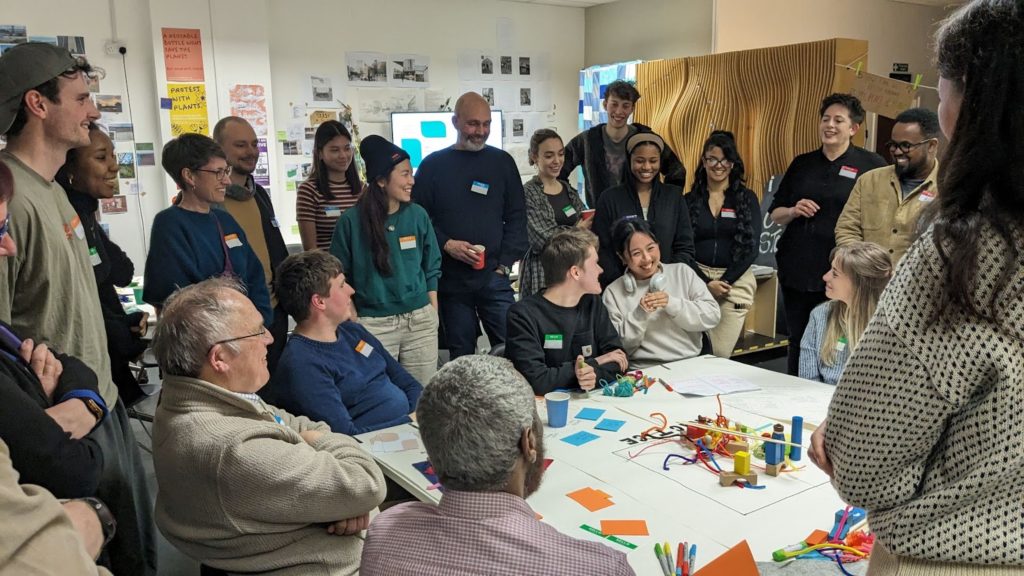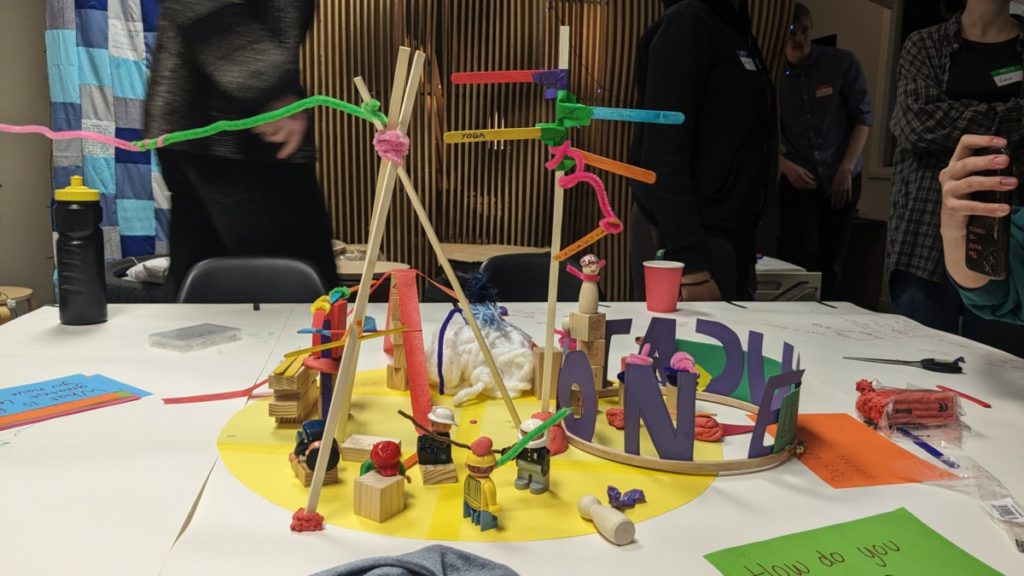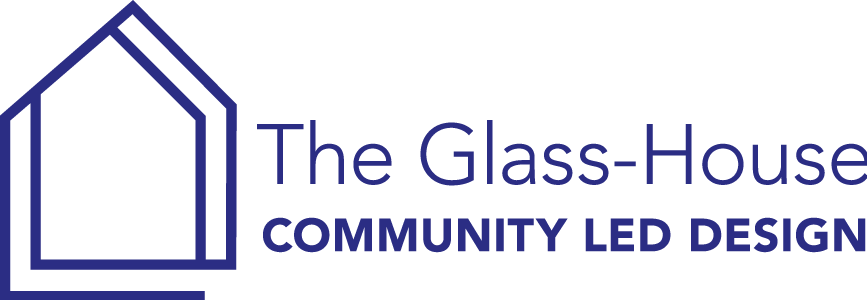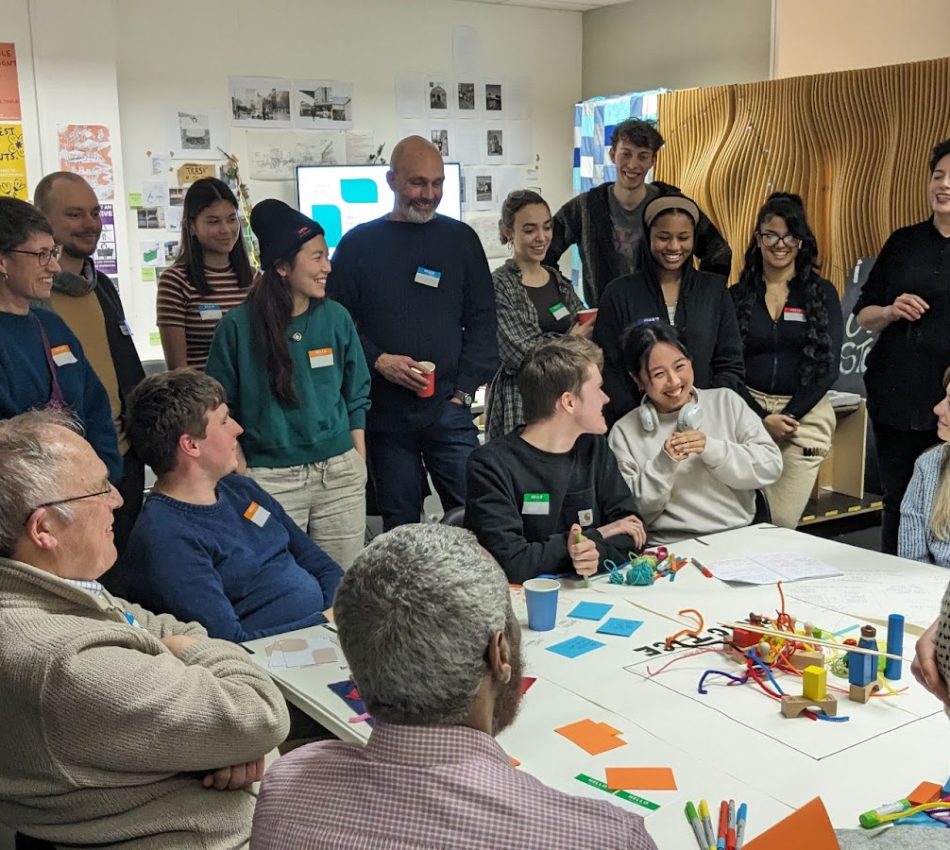Written by:
By Dr Zelda Hannay
Notes from The Leisure Society: taking a leisurely approach
At the recent ‘The Leisure Society’ event at Live Works in Sheffield – part of the The Glass-House’s WeDesign series People, Place and Planet – I was as inspired as Sophia to be part of a conversation that addressed rights and access to leisure. Through our inter-generational and inter-cultural dialogue, we explored the vital importance of protecting leisure time in our culture as a way of helping us to connect with nature, other people and ourselves.

Of the four groups at the workshop covering community, education, practice and ecology, each led by University of Sheffield student facilitators, one proposed the captivating idea of a ‘learning-ground’. Using the group’s colourful assemblage (see image below) as a prompt, I imagine a place with the same spontaneous, ebullient atmosphere of a playground but with the capacity to gift you with new knowledge, skills, perspectives and perhaps even friends or collaborators. It is outside and so your senses are activated; there are things to do and to feel as well as things to think. Crucially, you find your own way through, working in your own time, taking breaks when you want: you are, in fact, learning at your leisure. In imagining this place, then, I am reminded that to learn new things or have ideas – whether for ‘work’ or not – feeling relaxed, open and, well, leisurely, helps enormously.

What does it mean, then, to be more leisurely about our work? It’s not that deadlines and time management aren’t useful and necessary. It’s also not that work time should bleed insidiously into down time as part of an ‘always on’/side hustle culture.

As Jenny Odell puts it in her book How to Do Nothing, ‘we submit our free time to numerical evaluation, interact with algorithmic versions of each other, and build and maintain personal brands’, all of which gives us ‘a certain nervous feeling, of being overstimulated and unable to sustain a train of thought’, and this is damaging to us and makes us unhappy. Instead – and this was the key takeaway for me of our discussion – creativity, reflection and collaboration thrive on a combination of relaxation and focus. As anyone creative knows – and that’s basically all of us – you can struggle to come up with a new idea or solve a problem whilst you’re at work, but then in another moment altogether – walking the dog or doing the drying up – the answer suddenly pops into your head. Leisure time and work time need one another.
For three years I managed the Transforming and Activating Places (TAP) programme at the University of Sheffield, a student knowledge exchange programme that supported students from under-represented backgrounds to work on placemaking projects with organisations across the UK, including The Glass-House. In that time, I had many conversations with students about what it means to bring your whole self (or not) to a work situation. We discussed the importance of different forms of knowledge: situations where lived experience might be just as relevant as expertise from a History or Law degree. We talked about how our passions, our values and what we do in our leisure time makes us who we are and inspires us to work. I also directly observed the way that students blossomed and grew in confidence when they felt more relaxed, more playful, less pressurised and less judged.
My experience of working with our brilliant TAP students, and the insightful questions and explorations we surfaced at ‘The Leisure Society’ event, make me consider how we might (at least sometimes) embrace leisure as a method. Perhaps a leisurely approach to solving problems and creating new things – whether that’s in placemaking work or not – is about giving ourselves the space and time to think about the diversity of experiences and knowledges we each bring to the table and about being comfortable with not knowing what will emerge. It can sometimes feel impossible in our deadline-driven productivity culture, but embracing leisure can be a form of resistance, a vote for creativity, community and care and an acknowledgment of our whole selves.
References
Odell, Jenny (2019), How to Do Nothing: Resisting the Attention Economy, Melville House
About the Author
Dr Zelda Hannay is a researcher, teacher and dramaturg based in Sheffield. For three years she was Senior Project Manager of the award-winning Transforming and Activating Places (TAP) student knowledge exchange programme at the University of Sheffield. She is currently concentrating on some leisure time before starting her next project.

